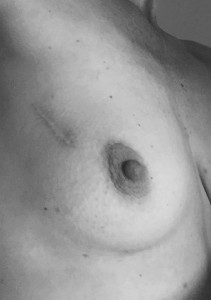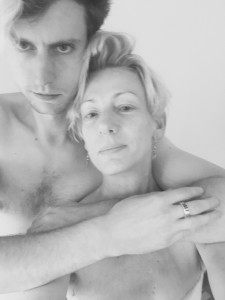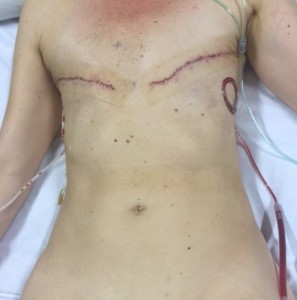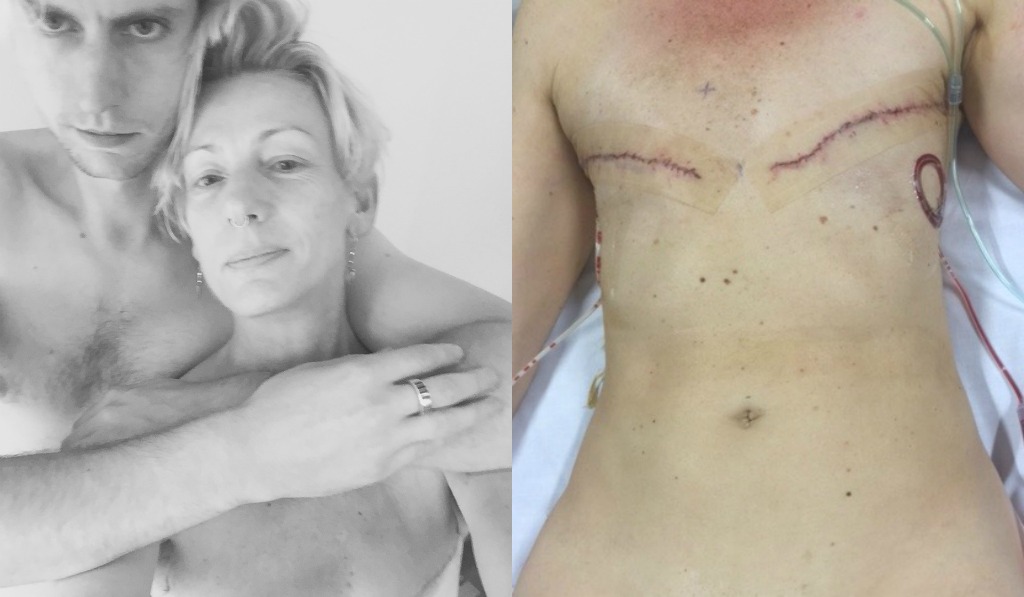Vicki Melson Tells Us “How Losing My Breasts Made Me Complete”
By admin
October has been Breast Cancer Awareness Month. To raise awareness for LGBTIQ breast cancer and health, we have the privilege (thanks to ACON’s #TalkTouchTest campaign) of sharing Vicki Melson’s personal journey through breast cancer diagnosis, and how her Queer community helped her navigate that journey.
In 2013 I found a lump in my breast. It was hard, like a tiny pea, and the flesh around it felt thickened. My GP told me not to worry, she couldn’t feel it, but I fussed so she sent me for tests. The mammogram was clear, but the ultrasound showed a tiny black spot, probably a cyst they said.
I remember the fear that day. The vulnerability of sitting half naked under a harsh fluorescent light, alone in a small room, waiting. There was so much waiting.
Diagnosis took seven weeks and is the worst place to reside. Multiple tests and biopsies left me feeling like a human pincushion but eventually I was diagnosed with grade one, stage one, tubular breast cancer. I had a lumpectomy and seven weeks of radiotherapy. I was left exhausted, with a small scar on my breast, my badge of honour, which I loved.

I decided, against my better judgment, to keep my initial diagnosis quiet. As a result I felt a sense of shame. To be a person with cancer instantly cast me as a vulnerable human, tearing down the unbreakable façade that I chose to live behind. I cried a lot, I felt displaced. I wanted to tell my story but I didn’t feel strong enough.
And then my partner left me.
So there I was, 49 years old and single. I looked at my options. I could stay home and disappear or I could get over a multitude of social phobias and get out there. I chose the latter. I accepted all invitations, I pretty much broke Tinder, and I made a point of embracing the community that I had flirted with for so long: the queer community, a place where I had always felt safe and complete. The dancefloor became my healing place and its inhabitants welcomed me with loving arms. I became strong again.

I faced stressful yearly check ups which forced me back into a space of extreme vulnerability, each time feeling once again that my life was hanging in the balance. The first year’s results were clear, the second, borderline. As the months passed I learned not to feel consumed by the fear of recurrence, then just as I relaxed, the cancer returned.
My third year MRI revealed a dark spot in my right breast. It was untraceable on both mammogram and ultrasound, which made standard biopsy impossible. My only option was an MRI guided biopsy. I was used to MRIs by now, despite being claustrophobic, but this one was different. There were nine people in the room, all talking about me. I was clearly a science experiment and I’ve never felt so inhuman.
One kind nurse noticed I was shaking. “I’m part greyhound”, I said. She patted me. My breast was drilled into repeatedly. I started to weep and the nurse stroked me. “You’re a very brave greyhound,” she said. I fell to pieces.
I was diagnosed once again with early stage breast cancer. My brain was exploding. I was told my only real option was to have a single mastectomy. I had previously told my therapist that I would rather die than lose my breasts. I had a lot of work to do, and fast, so I reached out to my community, my Queerdoes, my body positive, non-judgmental darlings who saw life through phenomenal eyes. We talked for hours about bodies. What it is to be human, what it is to be a sexual being and in what form. We explored blood and scars and sex and death.
I went out a lot. Raw, vulnerable, broken again, but my community held me up. One night, I needed to dance. The community was out in force and I unexpectedly found myself on “boobwatch”. I just couldn’t stop staring at people’s chests. The group around me consisted of a friend who LOVES her breasts and displays them in their enormity on a regular basis, another, who had theirs bound, and waits patiently to have them removed by choice, and another, who was in the process of growing some with the help of hormones. One of their friends danced nearby, genderless, unbelievably beautiful. I was transfixed.
That night became a catalyst for me. It cemented, in my fragile brain, the knowledge that everything was quite perfectly fine; that I had found my place and continued to belong, to be loved, to live.
I made a choice to remove both breasts and not to rebuild. I am a symmetry freak, androgynous, lean. I became a tad obsessed with how I could potentially look. Previous radiotherapy ruled out the possibility of implants so my only option was a tram flap reconstruction, which cut through my abs and built me breasts from my stomach fat. I have no stomach fat. My abs are fabulous. Fuck that! It seemed horrific to me that I should have to conform to societies expectations of what the shape of a woman should be. I never once doubted my decision.
I went into surgery smiling, but nervous, terrified that I might not accept my new torso. As soon as I woke up from the anesthetic a doctor came over to check my scars. He pulled down my gown and nervously I looked down at the two diagonal scars across my chest and was flooded with love.
They were beautiful. I was beautiful.

Cancer changed my life in the most unexpected ways. It liberated and empowered me. To look fear in the face, to take those steps of self -care is the strongest thing that people can do for themselves.
Sure, cancer made me vulnerable. But that vulnerability forced me to rely on others for the first time in my life, which in turn allowed me to recognize how much I was loved. Losing my breasts ironically allowed me to become complete. And for that I am truly grateful.
Words and Images courtesy of Vicki Melson.
Lesbian, bi and queer women are often invisible in breast cancer awareness campaigns – despite research that suggests they have higher risks for breast cancer and lower cancer screening rates.
ACON’s #TalkTouchTest campaign is working to remedy this by photographing LBQ women: showing their diverse relationships, bodies and genders, celebrating the cultures of care that exist in our diverse communities and encouraging LGBTI people to Talk, Touch, and Test.
To find out more about breast health and breast screening by visiting Talk, Touch, Test HQ at ACON

